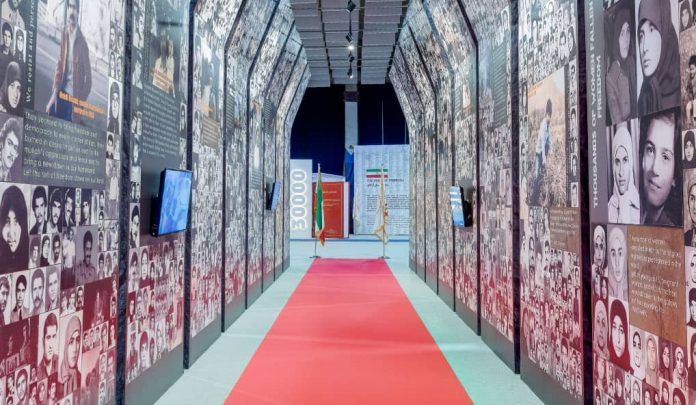On Human Rights Day: International Community Should End of Iran’s Impunity


Museum 120 years of struggle for freedom in Iran- Ashraf-3 Albania
Written by
Sedighe Shahrokhi
Museum 120 years of struggle for freedom in Iran
Museum 120 years of struggle for freedom in Iran- Ashraf-3 Albania
Thursday marks the UN’s annual Human Rights Day, which raises the question of whether the year ahead will finally be the year when the international community takes serious measures to address crimes and abuses that have gone ignored for decades.
After three decades of injustice, a group of United Nations human rights experts published their letter to the regime’s authorities on the 1988 massacre of Iranian political prisoners, saying the 1988 massacre “may amount to crimes against humanity.”
They also reiterated that if the regime refuses to investigate and “uphold its obligations under international human rights law,” they call “on the international community to take action to investigate the cases including through the establishment of an international investigation.”
The western governments’ appeasement policy has emboldened the regime and given it a sense of impunity to continue its crimes against humanity. Now, after this letter, which the Amnesty International called a “tuning point,” the international community has this opportunity to hold the regime to account for its crimes.
It will be an absolute tragedy they won’t. Even the past few years’ developments are sufficient to demonstrate that further suffering looms for the Iranian people if the regime is not compelled to change its behavior. And when those recent developments are put in context with Iran’s past abuses and crimes against humanity, it becomes clear that a weak response to the ongoing humanitarian crisis will pave the way for mass casualties.
The current crisis began to unfold around the beginning of 2018, when the regime found itself rocked by a nearly unprecedented uprising. The movement saw residents of well over 100 cities and towns chanting slogans like “death to the dictator” and demonstrating a collective commitment to installing an altogether new, entirely democratic system of government in Tehran. The nationwide protests naturally met with violent crackdowns by regime authorities, which left dozens dead and thousands in jail.
But the legacy of those crackdowns now pales in comparison to that of another crackdown on an even larger uprising that took place just over a year ago. In November 2019, gasoline price increases served as a vivid reminder of the Iranian regime’s disregard for people’s plight. In response, protests broke out in nearly 200 localities all at once, with participants reclaiming the same slogans that had defined the earlier uprising. This time, regime institutions like the Islamic Revolutionary Guard Corps (IRGC) responded with even deadlier intend, opening fire on crowds with live ammunition and shooting to kill.
Iran Protests: Nationwide Uprising in Iran- November 2019
The National Council of Resistance of Iran (NCRI), soon reported that the death toll from clashes in November 2019 reached approximately 1,500 over a period of just several days. Over the following year, the crisis continued to get worse, with many of the arrestees being tortured and denied access to medical treatment, often in the interest of securing forced confessions. Those confessions, in turn, have been used in a familiar way by the Iranian judiciary, to justify capital sentences for a number of peaceful protesters.
The latest onslaught of these sentences should serve to remind the international community of one of the most unmistakable features of Iran’s contempt for human rights. Iran is well-recognized as the state with the world’s highest per-capita rate of executions. The regime’s reputation for overusing the death penalty is made even stronger by the fact that Iran remains one of the last countries in the world to routinely apply that sentence to cases in which the accused was under the age of 18 at the time of the crime.
This habit of juvenile execution is a clear violation of international law and of the universal human rights standards that were adopted by the UN General Assembly on December 10, 1948. Tehran is well aware of this, being a signatory to the International Covenant on Civil and Political Rights and the Convention on the Rights of the Child. But through all the years that the Iranian regime has been subject to UN resolutions and other formal condemnations of its human rights record, its officials have developed a habit of shamelessly disregarding the very concept of universal human rights.
While the Iranian regime technically maintains its own internal human rights monitor, his role in practice is only to contradict international condemnation while insisting that juvenile execution, political imprisonment, and other forms of state violence are all in line with the regime’s own unique conception of ethical behavior. Some other regime officials have even gone so far as to publicly defend the mass execution of political prisoners, and to insist that the ethics of such brutality are sound because they are based on “God’s command.”
This was the phrase used by the regime’s former Minister of Justice Mostafa Pourmohammadi in a 2016 state media interview that addressed new public disclosures about a massacre of political prisoners in 1988. In the summer of 1988, Pourmohammadi assumed a role in the “death commissions” that were assembled in prisons throughout the country with orders to interrogate detainees over their political affiliations and to facilitate the execution of all those who refused to disavow their beliefs.
At the hands of those interrogators, over 30,000 political prisoners were hanged over the course of several months. The vast majority of the victims were members or supporters of the People’s Mojahedin Organization of Iran. The MEK played a leading role during the nationwide uprisings in both 2018 and 2019. Pourmohammadi cited the death commissions’ focus on the MEK as a reason why, nearly 30 years later, he remained “proud” of his role in the 1988 massacre.
The sentiment itself is a symbol of the severe moral rot at the heart of the Iranian regime. Meanwhile, the fact that figures like the former Justice Minister are willing to utter that sentiment aloud is a sign of the impunity that they enjoy in most matters related to human rights. No one has ever been held accountable for the 1988 massacre, and many of its perpetrators remain in positions of tremendous power and influence even to this day. It is therefore no wonder that the regime had no qualms about killing 1,500 peaceful protesters during the latest mass uprising.
If the lack of accountability persists, there is a strong chance that the next crackdown will be even worse. And it is all but certain that there will be another crackdown at some point in the near future, because it is all but certain that there will be another uprising. Even regime officials have been warning one another about this, citing past crackdowns, public outrage over a mismanaged coronavirus response, and the growing influence of the MEK as contributing factors.
The international community barely features in the regime’s discussion of domestic matters, because most Western powers have long since resolved to keep distant from those matters. But in so doing, those nations have abdicated their moral responsibility to help enforce universal human rights principles, especially in situations where rights are being abused systematically, across an entire population, and in an escalating fashion. This conciliatory approach to the regime is baffling because the global defense of human rights is clearly one of the proudest defining features of Western democracies.
That pride is expressed every year with the recognition of Human Rights Day, but it is rendered meaningless if the international community still refuse to exert serious pressure on the Iranian regime by increasing sanctions, spearheading investigations, and making diplomatic and trade relations contingent upon demonstrable improvements to Iran’s human rights record.
Now following the letter by the UN experts, the world community has this chance to stop the regime’s ongoing human rights violations, by holding mullahs accountable for their “worst crimes against humanity.”
On Human Rights Day: International Community Should End of Iran’s Impunity

